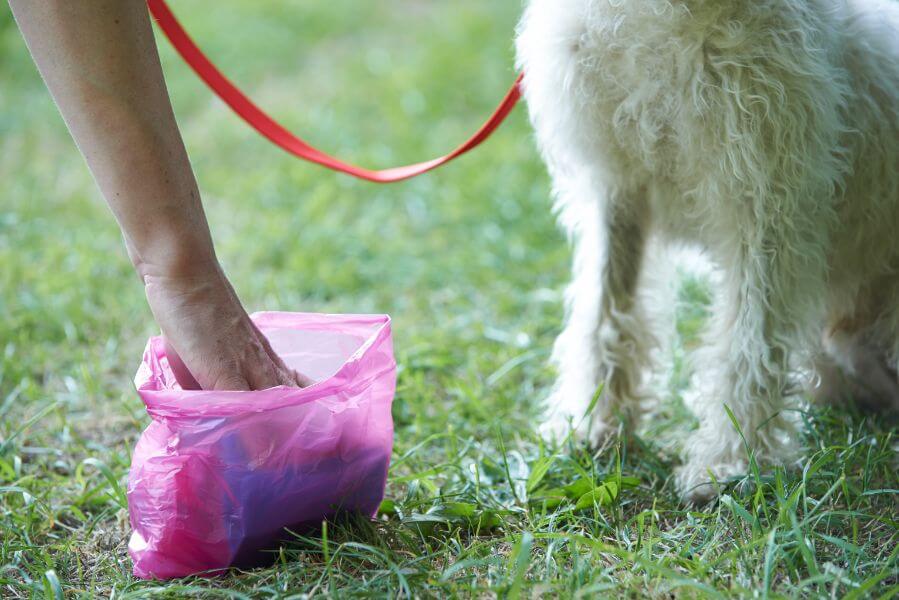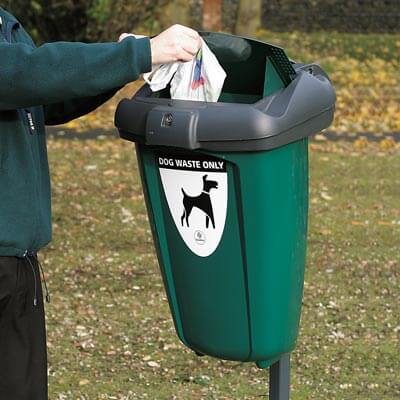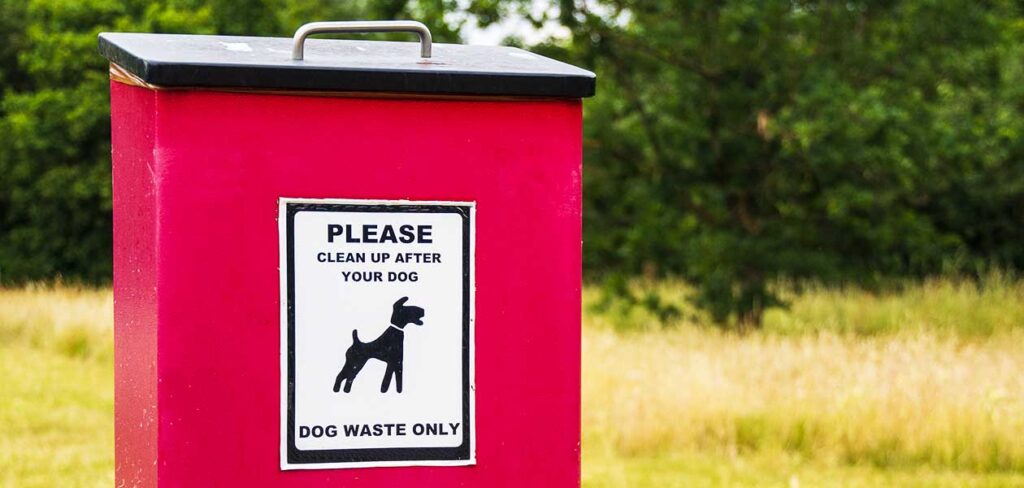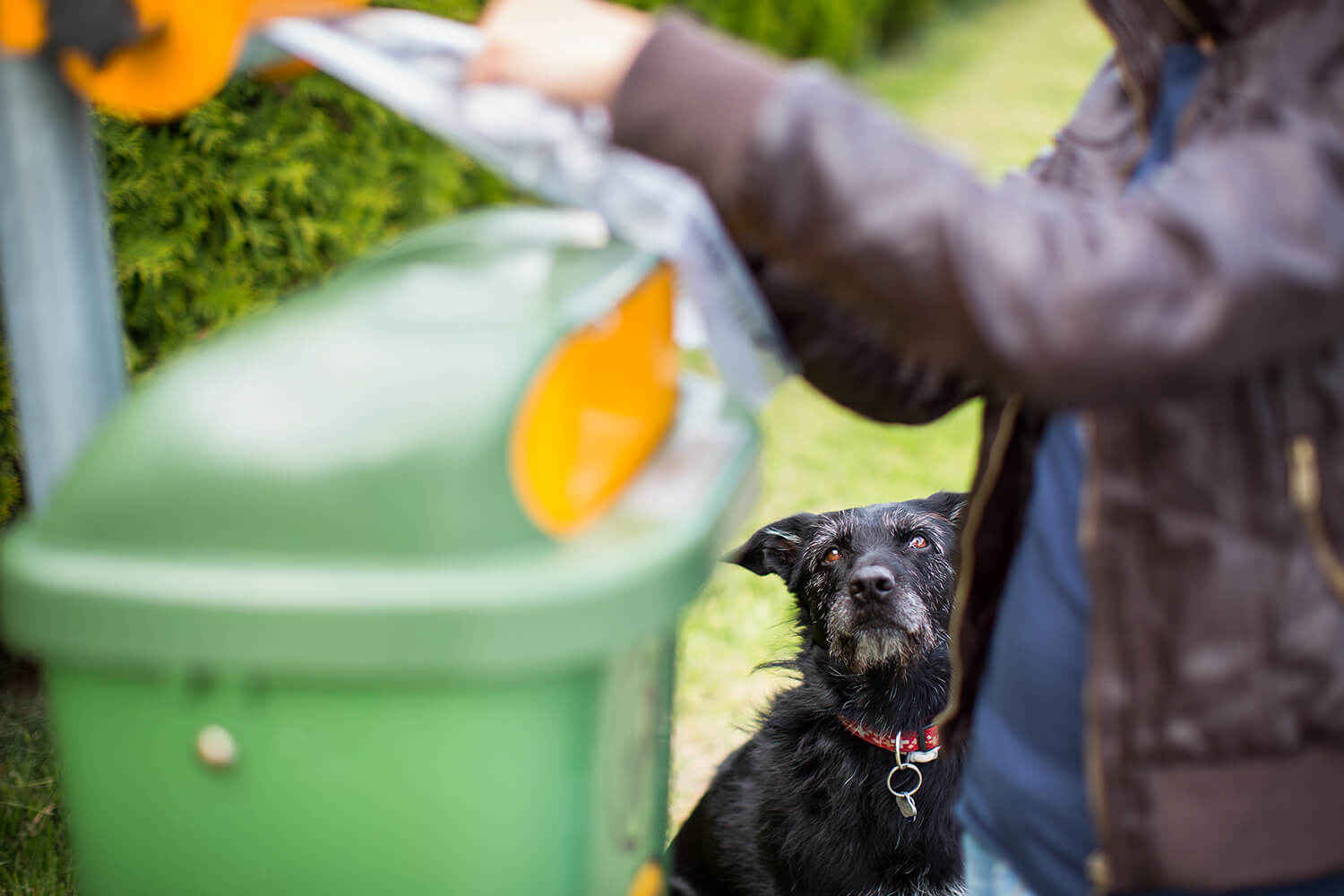Most jurisdictions have laws that require dog owners to pick up their pet’s poop failure to which they will face a fine.
The laws apply to all dogs regardless of size or breed and are designed to help keep the city’s parks and sidewalks clean and to prevent the spread of diseases.
While some dog owners may view the law as an inconvenience, it is important to remember that picking up after your pet is a responsibility that comes with owning a dog.
In addition to helping to keep the city clean, picking up dog poop also helps to protect public health.
Dog feces may contain harmful bacteria that can cause gastrointestinal illness in humans.
By picking up after your pet, you can help prevent the spread of diseases and keep yourself and others healthy.
But what should you do after picking up the dog poop?
Can you dispose of it in the garbage and what does the law say concerning this?
Is It Illegal To Put Dog Poop In The Garbage?

No law makes it illegal to dispose of dog poop in the garbage can.
That said, the law requires every pet owner to clean up after their dogs and to properly dispose of the poop.
Proper disposal means placing the dog feces into a plastic bag, tying it up tightly, and then placing the bag in an appropriate garbage can.
You should try to avoid leaving your pet’s poop anywhere other than in a garbage can because this may attract flies or other insects that could contaminate food if they get inside homes or restaurants.
While there are no laws that specifically prohibit you from putting dog poop in the garbage can, doing so may cause problems for your neighbors and other people who live and work in your community.
Not only would putting dog poop in the garbage can create a mess that may attract flies and other insects, it could also cause unpleasant smells that can bother your neighbors.
You should always try to keep the surroundings of your home or business clean and free of any unsightly items because it is a neighborly thing to do.
You may also want to check:
Do You Legally Have To Pick Up Dog Poop?
Is It Illegal To Leave Dog Poop In Your Yard?
Does Dog Poop Go In Compost Or Garbage?

Dog poop is compostable, which means that it can safely be added to your compost bin.
However, before putting dog poop in a compost bin or pile, you must first ensure that the material has received sufficient time to decompose and that the feces do not contain any harmful bacteria.
According to experts, you shouldn’t try composting dog poop before you take into account the two main risks—germs and bad smells.
You should also avoid adding dog poop into a finished compost pile because this could cause unpleasant smells as well as potential health risks.
Additionally, you should also avoid adding dog poop to your garden because this could introduce bacteria that may contaminate your vegetables and fruits.
So, what is the right way of safely composting dog poop?
Well, there are two methods you can use: purchasing a pet waste composter and DIY composting.
Pet waste composters are specialized devices that are designed to safely break down dog feces, and they make the composting process easier and more efficient.
You typically dig a hole in the ground where you install the system.
You can then use the system for composting the dog poop.
However, these devices may be expensive to purchase which is why some people prefer to DIY compost their pet’s poop instead.
If you choose this method of composting your dog waste, it is important to take necessary safety precautions such as wearing gloves and wearing a mask to avoid breathing in the bacteria that could be present.
When done correctly, composted dog waste can be used in the regeneration of flowers, grass, and other plants.
Learn more here: Is Dog Poop Good For Anything?
But since composting is not practical for every dog owner, you can still safely dispose of your dog’s poop in the garbage.
For instance, if you live in an apartment complex where there are lots of dumpsters, then it may be okay to throw away dog poop into the garbage bin since you will not be affecting other people’s well-being.
However, if you live in a private home or apartment that shares one garbage bin with your neighbors, then it would be best to avoid putting dog poop in the garbage can because of the unpleasant smell and potential health risks that this could cause for other people.
If you must throw away your dog’s poop, you can do so by placing it in a plastic bag, tying it up tightly, and then disposing of it in the garbage can.
It is important to avoid leaving dog feces anywhere other than in the garbage because this could attract insects like flies and other possible health hazards for people walking or working near the area.
Is It Against The Law To Put Dog Poop In Someone Else’s Bin?

There is no specific law that prohibits the disposal of dog poop in another person’s bin without their consent.
However, there are some general laws and regulations regarding waste management that may apply to this situation.
For example, keeping your surroundings clean and free of unsightly items (such as dog feces) is considered a matter of public health and safety, which may be enforced by local authorities.
Additionally, depending on the specific policies of your municipality, it may be illegal to dispose of dog waste in another person’s bin or any other public area without first taking appropriate precautions to prevent contamination or odors.
Therefore, it is safer to avoid putting dog poop in another person’s bin without their consent, as this may result in fines or other legal consequences.
If you have any questions about the laws and regulations governing waste management in your area, it is best to speak with a local government official or waste management professional for more information.
Someone Put Dog Poop In My Bin: What Can I Do?

If you suspect that someone has put dog poop in your bin without your consent, there are a few steps you can take to address the situation.
First, you may want to contact your local authorities or waste management professionals to report the incident and seek guidance on how to proceed.
If you are a renter, you may want to contact your landlord to ask for their assistance in addressing the situation.
In addition, it is best to avoid touching the dog poop in your bin and instead take steps to contain the waste as best as possible.
This may involve covering the bin with a heavy-duty plastic bag or other barriers, and then disposing of the contents as soon as possible.
You may also want to check: What to Do When a Neighbor’s Dog Poops In Your Yard
Where Can You Put or Throw Dog Poop Legally?

There is no specific law that dictates where you can dispose of dog poop, as this will depend on the laws and regulations in your area.
However, some general guidelines may apply.
For example, it is generally considered safe to put or throw away dog waste in public trash bins or other designated disposal areas that are safely maintained and regularly cleaned by your municipality.
Additionally, if you have access to a compost pile or other private area where you can safely contain and decompose dog feces, this may be another option for legally disposing of pet waste.
However, it is important to consult with your local authorities or waste management professionals to determine the regulations that apply in your area, as these may vary depending on the specific waste management policies in place.
Final Verdict
Even though there is no specific law that dictates where you can dispose of dog poop, there are generally accepted guidelines and best practices that should be followed.
This includes putting or throwing away dog waste in public trash bins or other designated disposal areas, as well as using compost piles or other private locations if available.
You may also consult with your local authorities or waste management professionals to ensure that you comply with any applicable laws and regulations.
Recommended For You:
As an Amazon Associate, we may receive a small commission from qualifying purchases but at no extra cost to you. Learn more. Amazon and the Amazon logo are trademarks of Amazon.com, Inc, or its affiliates.

